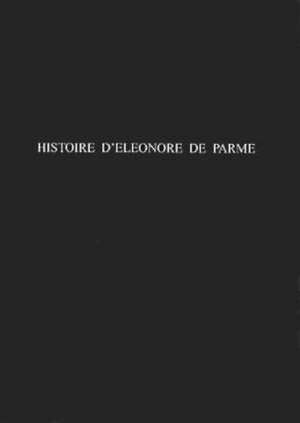Histoire d'Eleonore de Parme: source perdue de 'La Chartreuse de Parme': Exeter French Texts
Editat de Richard Bolsteren Limba Engleză Paperback – 31 dec 1996
In 1810, Stendhal read the sentimental novella Histoire d’Eléonore de Parme, whose anonymous author was certainly a woman. His interest in English Gothic literature was aroused when such novels became popular in France after the Revolution. Can it be asserted that Stendhal took inspiration from this novella when he wrote La Chartreuse de Parme? The cultural affinity between the two texts is certain, and there are significant similarities between the two narratives. Stendhal told Balzac he had a real model for the characters of Sandrino and Clélia, but it is probable he did not take inspiration from life, but rather from the fictional Eléonore.
This is Volume XCVIII in the series Exeter French Texts/Textes littéraires. It includes an introduction, select bibliography and essential notes, all in French.
Din seria Exeter French Texts
-
 Preț: 233.88 lei
Preț: 233.88 lei -
 Preț: 230.79 lei
Preț: 230.79 lei -
 Preț: 341.07 lei
Preț: 341.07 lei -
 Preț: 285.18 lei
Preț: 285.18 lei -
 Preț: 195.85 lei
Preț: 195.85 lei -
 Preț: 230.79 lei
Preț: 230.79 lei -
 Preț: 228.88 lei
Preț: 228.88 lei -
 Preț: 286.17 lei
Preț: 286.17 lei -
 Preț: 150.80 lei
Preț: 150.80 lei -
 Preț: 151.05 lei
Preț: 151.05 lei -
 Preț: 149.91 lei
Preț: 149.91 lei -
 Preț: 150.60 lei
Preț: 150.60 lei -
 Preț: 150.58 lei
Preț: 150.58 lei -
 Preț: 150.52 lei
Preț: 150.52 lei -
 Preț: 150.00 lei
Preț: 150.00 lei -
 Preț: 150.52 lei
Preț: 150.52 lei -
 Preț: 150.26 lei
Preț: 150.26 lei -
 Preț: 150.00 lei
Preț: 150.00 lei -
 Preț: 151.68 lei
Preț: 151.68 lei -
 Preț: 149.79 lei
Preț: 149.79 lei -
 Preț: 149.19 lei
Preț: 149.19 lei -
 Preț: 151.52 lei
Preț: 151.52 lei -
 Preț: 150.58 lei
Preț: 150.58 lei -
 Preț: 153.29 lei
Preț: 153.29 lei -
 Preț: 150.79 lei
Preț: 150.79 lei -
 Preț: 150.36 lei
Preț: 150.36 lei -
 Preț: 151.53 lei
Preț: 151.53 lei -
 Preț: 150.57 lei
Preț: 150.57 lei -
 Preț: 148.75 lei
Preț: 148.75 lei -
 Preț: 149.35 lei
Preț: 149.35 lei -
 Preț: 149.54 lei
Preț: 149.54 lei
Preț: 149.54 lei
Nou
Puncte Express: 224
Preț estimativ în valută:
28.62€ • 31.10$ • 24.06£
28.62€ • 31.10$ • 24.06£
Carte indisponibilă temporar
Doresc să fiu notificat când acest titlu va fi disponibil:
Se trimite...
Preluare comenzi: 021 569.72.76
Specificații
ISBN-13: 9780859895361
ISBN-10: 085989536X
Pagini: 32
Ilustrații: illustrations
Dimensiuni: 201 x 147 x 5 mm
Greutate: 0.13 kg
Ediția:First edition
Editura: UNIVERSITY OF EXETER PRESS
Colecția University of Exeter Press
Seria Exeter French Texts
ISBN-10: 085989536X
Pagini: 32
Ilustrații: illustrations
Dimensiuni: 201 x 147 x 5 mm
Greutate: 0.13 kg
Ediția:First edition
Editura: UNIVERSITY OF EXETER PRESS
Colecția University of Exeter Press
Seria Exeter French Texts
Notă biografică
Richard Bolster is Senior Lecturer in French, University of Bristol.
Recenzii
“ . . . interesting reading not only for Stendhalians. Scholars working on French-British interchange of the period, or French women's writing, will want to read Bolster's account of the overwhelming influence of English literature on French during the post-Revolutionary thirty years, and the sheer impact of novels written by women for women in both centuries.” –Modern Language Review
“Scholars working on French-British interchange of the period, or French women's writing, will want to read Richard Bolster's account of the overwhelming influence of English literature on French during the post-Revolutionary thirty years, and the sheet impact of novels written by women for women in both countries.” –MLR, 93-3, 1998
